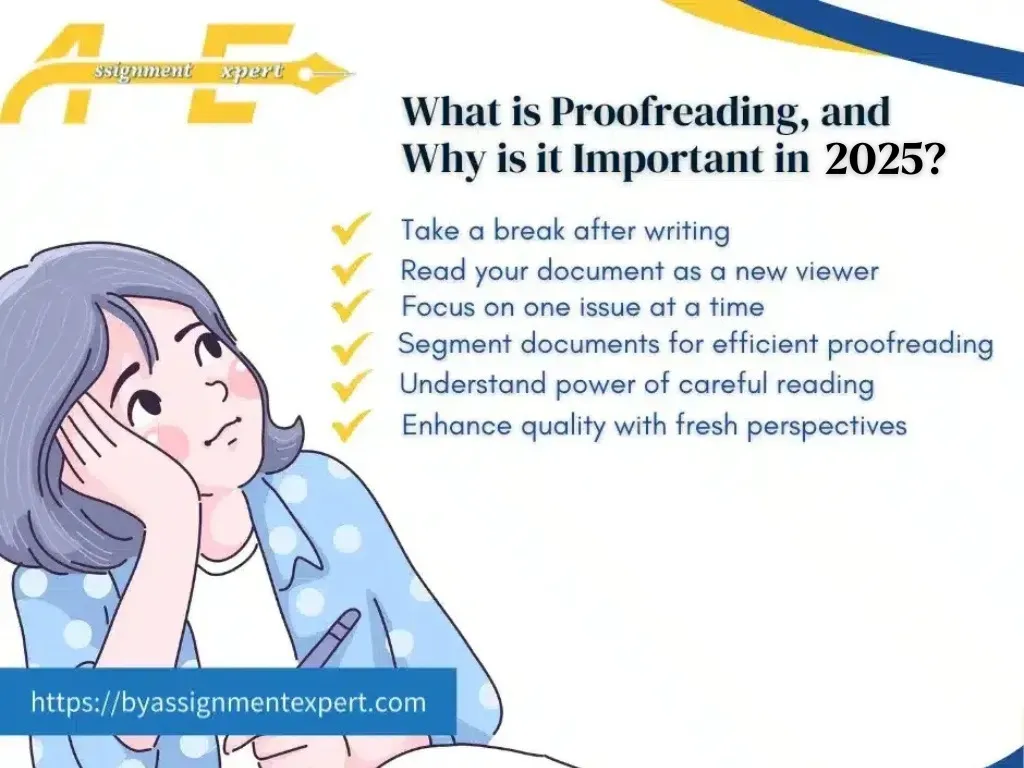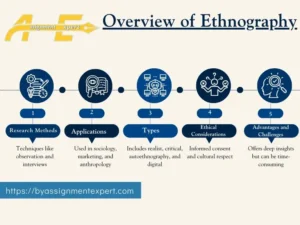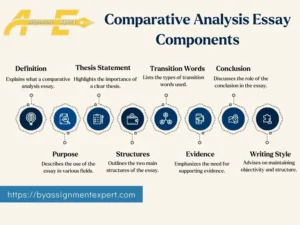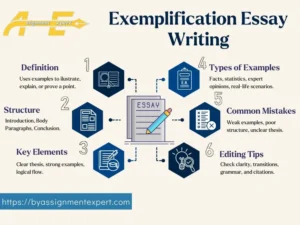Proofreading is a procedure that involves examining a written document to recognize and correct punctuation, grammar, spelling, and vocabulary errors. Good writing always involves revision and modification, and proofreading is a significant part of this practice.
A proofreader particularly has one main objective: to ensure that a written document is completely perfect in terms of vocabulary and grammar.
Best Practices for Proofreading
Professional proofreaders develop their proofreading and editing skills over time. Technical writing often has complex numbers and calculations that require a proofreader to pay attention to the grammar and ensure the material is easy and simple to understand. Follow these tips for great proofreading:
- Take a Break: Before proofreading, give yourself a break from the writing. This is to clear your mind and enable you to approach the next step with a fresh mind and perspective.
- See Things Differently: Make yourself see things from different perspectives, such as reading it as if the reader is reading it for the first time. This change in perception can help signify the errors and areas where the improvement is most effective.
- Focus on One Issue at a Time: Read written work several times by focusing on sentence structure, spelling, word choice, punctuation, and vocabulary. You can surely find the problems when you search for them.
- Break it Down: While trying to proofread the entire document at a time, break it down into smaller parts; this approach will let you concentrate on every section more significantly and reduce the chances of errors.
- Read Slowly and Carefully: It is suggested that you read each sentence and word with thorough care. Pay attention to the details and make sure that every sentence makes sense. By stopping yourself from rushing from proofreading, you can ensure an accurate review and comprehensive result.
- Seek a Second Opinion: Consider asking friends and associates to examine your work. Further eyes can frequently capture the errors and offer significant response on areas that need advancement.
Proofreading is significant for any text that will be shared with the viewers or students, whether it is an educational paper, an online article, a job application, or a flyer. You can choose proofreading options according to your budget using any proofreader tool or hiring a professional.
Why is Proofreading Important?
Proofreading focuses on improving your paper’s quality by leaving no space for errors or variations in the writing procedure. It is to achieve a well-defined goal where the written content is efficiently conveyed and every sentence is error-free and grammatically accurate.
Nobody can create an excellent text without reviewing, revising, or reflecting before submitting the final version of the text. The following reasons can clarify why you need to do proofreading:
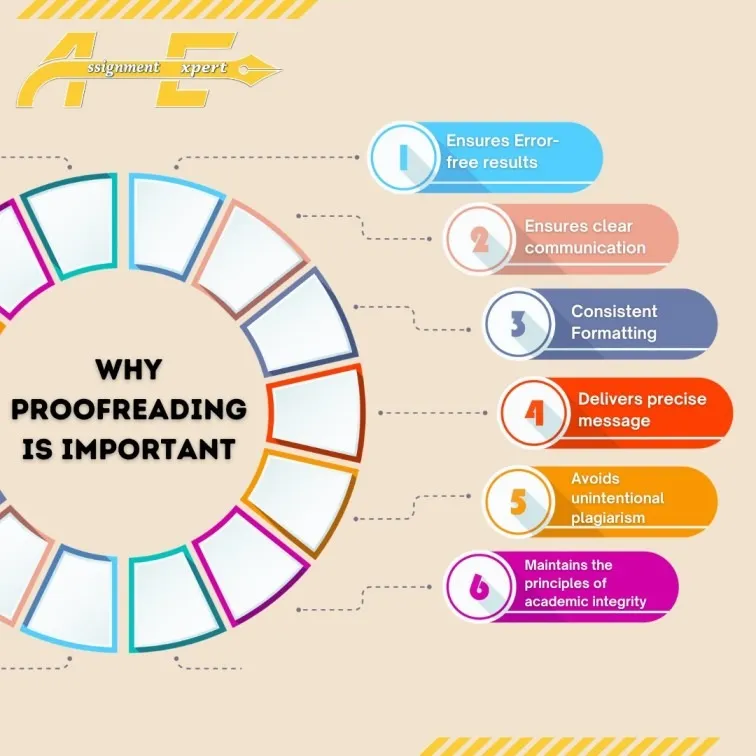
Significant proofreading is essential to get perfect and high-quality essays, whether professional or academic. Proofreading is the last step in writing, but it does not mean it is unimportant.
- Maintaining Integrity and Competence
- Providing a Clear and Efficient Message
- Safeguarding Academic Integrity
Maintaining Integrity and Competence
Maintaining integrity and competence is a significant part of any written communication. It shows the writer’s ability to deliver reliable and precise knowledge to the person who reads.
When the data is well-proof and error-free, it shows attention, high accuracy, and competence. This brings confidence and trust among the readers, who see the writer as a trustworthy resource.
Providing a Clear and Efficient Message
Providing a clear and efficient message is the clear ambition of every writer, and it is made possible by thorough proofreading. The expected message shines visibly and efficiently when the data is free from faults and well organized.
Readers can easily get the knowledge and ideas without being misunderstood or complicated. Clear communication is critical in proofreading. Accuracy and stability are central to business interactions. Whether it is marketing materials, business suggestions or customer communication data free from mistakes, ensures credibility and confidence.
In academic writing, clarity is significantly important. Proofreading essays and papers guarantee that research outcomes and claims are shown correctly, upgrading the probability of identification and recognition within the intellectual group.
Safeguarding Academic Integrity
Plagiarism is a serious ethical harm in academics. Through Proofreading, you can review your citations, sources, and references to ensure that you have properly acknowledged the ideas and concepts of others. This practice improves academic integrity and honesty by avoiding unintentional plagiarism and maintaining the principles of scholarly integrity.
Proofreading makes sure that your work aligns with the educational standards. By supporting these guidelines, you show respect towards professionalism. It reduces concerns and inconsistencies that may confuse the readers about your work.
Human proofreading vs AI proofreaders
Online proofreading tools and artificial intelligence (AI) cannot detect tone, style, or language problems that a human proofreader can. For instance, even though a sentence is technically correct, it could not be appropriate considering the text’s meaning or tone.
Even the vocabulary, grammar, and spelling check software can be very helpful, but they cannot ensure that your document will be free from errors. You might think that no red lines mean no mistakes, but machines can make mistakes, so it is important to proofread it yourself.
How to Find a Reliable Proofreading Service
The demand for professional proofreading services has significantly escalated through the years, and several corporations and people want to go for polished communication and publication. There are a few things that you should reflect on while considering for a certified proofreader.
- The qualifications of the proofreading service provider matter a lot, particularly the most significant factor to consider when choosing the services.
- Do a little research on credibility and service provider reviews to see their reliability and effectiveness. Crosscheck if the proofreader has the required qualifications and experience that are mentioned to make sure that your writing is error-free and combined with your academic discipline and industry.
- Choose services that offer customization built on your needs, no concern whether you want to check creative writing, academic work, or organization communication.
- The service should be capable to mark its methodology match your takes. Ensure that the proofreader meets your targets, as it is required to stabilize the fastness and productivity of checking provisions.
Final Words
In the world of academics, where understanding and knowledge are shared and created, the significance of proofreading is particularly considered underrated. Your academic work reflects your research, intellect, and your dedication towards must shine throughout. That is the reason why proofreading is dynamic in the writing process, as it benefits you to adjust your function and increase the effectiveness and correctness.
By devoting pace and resources to correcting, you can recover the excellence of your act, effectively convey your thoughts, and must be able to leave a long lasting positive impact on your academic accomplishments. Now, it is time to put these approaches into action. So, get your magnifying glasses. Prepare yourself to impress the readers with your exceptional work and leave a permanent positive image of yourself with your polished work. It’s time to discover the influence of editing and change your words from basic sentences to works of art.


